
| Degree Awarded | Discipline | Duration | Entry Level | Seats in IIST |
| B.Tech | IT | 4 years | 10+2 (PCM) | 60 |
The Department of Information Technology was established in the year 2007 with a vision to provide a place for Innovation, Scientific Discovery and New Technology. B.E. (IT) was introduced with an intake of 60 students. With the growing scope of digital technology in and around the world, constant development within the department has been taken place in all the spheres including infrastructure, personnel and student strength. As a way to impart a sound practical training within the students, the department is equipped with state of the art laboratories equipped with high-speed internet and computing facility. The faculty emphasizes in providing students with a practical learning experience which gives them an exposure to some of the latest and modern technologies and computer systems. Our 4-year degree program seeks to produce competent professionals in the IT field who can create connected solutions and kick start their career in the emerging IT sector.
A graduate of the Information Technology Program will demonstrate:
| Univ. Subject Code | Subject Name | CO Description |
| BT-201 | Engineering Physics | The Coursework is designed to provide students the opportunity to learn key concepts of Wave nature of particles and the Schrodinger equation. |
| Student will able to understand the knowledge of Wave optics i.e. interference and diffraction. | ||
| To introduce the idea of solids like semiconductors (P type and N Type semiconductors), Diodes and Hall effect. STudents will also be able to understand the basic concept of superconductivity. | ||
| To develop the understanding of Lasers, fiber optics and their applications in field of engineering sciences. | ||
| To provide you to basic understanding of Electrostatics in vacuum. | ||
| BT-102 | Mathematics-I | To introduce the fallouts of Rolle’s Theorem that is fundamental to application of analysis to Engineering problems. |
| To introduce the idea of applying differential and integral calculus to notions of curvature and to improper integrals. Apart from some applications it gives a basic introduction on Beta and Gamma function | ||
| To develop the tool of power series and Fourier series for learning advanced Engineering Mathematics. | ||
| To familiarize the student with functions of several variables that is essential in most branches of engineering | ||
| To develop the essential tool of matrices and linear algebra in a comprehensive manner. | ||
| BT-203 | Basic Mechanical Engineering | Understand the properties of material, stress strain. Properties of alloys and cast iron. |
| Understand the concept measurement and machine tools their operations and their applications. | ||
| Understand the concept of fluid flow , properties of fluid, Bernoulli’s equation, Pascal’s law. | ||
| To Understand the concept of heat and temperature, law of thermodynamics, boilers and their mountings and accessories, basic Refrigeration cycles and its applications. | ||
| To Understand the working of different cycles and 4 strokes, 2 stroke engines and their applications. | ||
| BT-204 | Basic Civil Engineering & Mechanics | Students will acquire the basic knowledge in different fields of civil engineering and materials used in construction. |
| Gain the ability to use modern survey equipment to measure angles and distances. | ||
| Students will understand the basic of contour lines and map | ||
| Students will have the ability to identify, formulate and solve engineering problems related to Engineering Mechanics: Statics | ||
| Students will be able to analyse beam for shear force and bending moment. | ||
| BT-205 | Basic Computer Engineering | Able to understand the basic applications of computers in various fields, describe operating system, its role and functionalities and to apply concepts of MS word, MS power point, MS Excelefficiently. |
| Discuss and apply simple algorithms for arithmetic and logical problems. | ||
| Translate the algorithms to programs applyingobject-oriented concepts in C++ programming language. | ||
| Understand basics of computer networks, OSI layers and protocols, E commerce applications, impact of securitythreats and attacks on networking systems and also security measures | ||
| Understand the different method for representing and processing data and to get awareness about the impact of cloud computing, its various type of services. | ||
| BT-206 | Language Lab & Seminars | learners to develop good listening skills. |
| Encourages learner to talk freely and lose their shyness when talking in front of the people | ||
| To develop the overall personality of the students by the practical activities | ||
| Helps in confidence building, motivation to be more presentable and help in removing the stage fright | ||
| Develops speaking, writing, reading, listening and presentation skills. | ||
| BT-101 | Engineering Chemistry | Differentiate hard and soft water; solve the related numerical problems on water purification and its significance in industry and daily life. |
| Select the lubricant for various purposes based on the type of Machines. |
||
| Equipped with basic knowledge of polymer , methods of polymerization and various industrial applications of polymers |
||
| Draw the Phase diagrams of one & two component systems and causes, consequences and methods to minimize corrosion to improve industrial designs. | ||
| Identify the structure of unknown/new compounds with the help of spectroscopy and understand periodic properties such as ionization potential, oxidation states and electro negativity | ||
| BT-202 | Mathematics-II | To introduce effective mathematical tools for the solutions of ordinary and partial differential equations that model physical processes. |
| To introduce the tools of differentiation and integration of functions of complex variable those are used in various techniques dealing engineering problems. | ||
| To acquaint the student with mathematical tools available in vector calculus needed various field of science and engineering. | ||
| BT-103 | English for Communication | Effective use of verbal and non-verbal communication for enhanced soft skill beside enhanced reading comprehension as well |
| Write the different kinds of letters, reports and technical writing. | ||
| Apply basic rules of grammar in both written as well as oral communication. | ||
| BT-104 | Basic Electrical & Electronics Engineering | To introduce the concept of Basics of DC electrical Network including network theorems. |
| To introduce the concept of Basics of AC electrical Network(single phase & 3 phase).. | ||
| To study of law of Electromagnetism, introduction of transformer. | ||
| To study of various electrical Machines. | ||
| To study Basic Concept Digital Electronics. | ||
| BT-105 | Engineering Graphics | Draw various types of scales, and curves. |
| Draw orthographic projections of points & lines | ||
| Draw orthographic projections of Planes & Solids | ||
| Draw sections and development of solids including cylinders, cones, prisms and pyramids. | ||
| Draw isometric views of Planes and Solids, Drawing using AUTOCAD. | ||
| BT-106 | Manufacturing Practices | Use hand and power tools for different manufacturing processes |
| Operate machine tools while preparing any component | ||
| Select the appropriate tools required for specific operation. | ||
| Comprehend the safety measures required to be taken while using the tools. | ||
| Prepare Foundry, Fitting, Carpentry, Welding and smithy Job. | ||
| BT-107 | Internship-I (60 Hrs Duration) at the Institute level | Demonstrate the application of knowledge and skill sets acquired from the course and workplace in the assigned job function/s |
| Solve real life challenges in the workplace by analysing work environment and conditions, and selecting appropriate skill sets acquired from the course | ||
| Exhibit critical thinking and problem solving skills by analysing underlying issue/s to challenges | ||
| Demonstrate appreciation and respect for diverse groups of professionals by engaging harmoniously with different company stakeholders | ||
| Exhibit professional ethics by displaying positive disposition during internship | ||
| BT-108 | Swachh Bharat Summer Internship Unnat Bharat Abhiyan (100Hrs)/ Rural Outreach | This course is to sensitize students about the socio-cultural aspects of the rural areas parochial to their colleges. |
| Students are expected to observe, investigate and learn about the following aspects of the rural region: i. Demographics, Literacy, Geographical parameters of the Village; ii. Schemes of government of India and State of Madhya Pradesh in operation in the villages. | ||
| To enhance critical thinking by making them participate in social activities and imbibe human values among them. | ||
| Rural Swachh Bharat Abhiyan is to promote cleanliness and develop healthy habits in people in villages. | ||
| Unnat Bharat Abhiyan: To build an understanding of the development agenda within institutes of Higher Education and an institutional capacity and training relevant to national needs, especially those of rural India. | ||
| ES-301 | Energy & Environmental Engineering | Get the knowledge of energy carriers, energy technologies, energy challenges and energy system integration and environment sustainability. |
| Learn about the different types of ecosystems present in environment, ecological succession and energy flow in the ecosystem. | ||
| Understand the value of biodiversity to human societies, threats to biodiversity, In-situ and Ex-situ conservation of biodiversity. | ||
| Acquire knowledge of different types of environmental pollution, its effects on life and its remedies | ||
| Aware about the social issue related to the environment, environment ethics, protection and conservation acts for the environment. | ||
| IT-302 | Discrete Structure | Students will be able to understand the notion of mathematical thinking and algorithmic thinking and be able to apply them in problem solving such as formula specifications, verifications and basic concepts of set theory. |
| Understand the basic principle of boolean algebra, logica and set theory | ||
| Be able to construct simple mathematical proof and possess the ability to verify them | ||
| Acquire ability to describe computing problems with the help of graph theory and Finite state machines, also express its utility in solving and modeling real time problems. | ||
| Apply basic counting techniques to solve combinatorial problem. | ||
| IT-303 | Data Structure | To understand the concept of linear, non-linear data structures, the operations performed on them and the applications of various data structures |
| Understand the arrays, searching and sorting algorithms | ||
| Implement stacks, queues and its applications | ||
| Implement linked list and its variations | ||
| Solve problem involving graphs, trees and heaps | ||
| IT-304 | Object Oriented Programming & Methodology | Recognise attributes and methods for give an objects |
| Define data types and also deal with operations applied for data structures | ||
| Implement algorithms and complex problems | ||
| Understand how to apply the major object-oriented concepts to implement object oriented programs in C++, encapsulation, inheritance and polymorphism | ||
| Classify inheritance with the understanding of early and late binding, usage of exception handling, generic programming. | ||
| IT-305 | Digital Circuits & System | Perform number base conversion, use Boolean logic to create digital circuits |
| Understand use of encoders, decoders, multiplexers and d-multiplexes in communication systems | ||
| By learning design of combinational and sequential circuits students can understand its use in digital systems such as computers, communication systems and other modern technologies | ||
| Study of a ADC and DAC along with display devices with enable students to understand signal conversion and its display and their applications and digital devices | ||
| IT-306 | JAVA Programming Lab | Understand fundamentals of programming such as variables, conditional and iterative execution, methods etc |
| Understand fundamentals of object oriented programming in Java and be familiar with important concepts like class, inheritance and multithreading, AWT and JDBC | ||
| The different data types, design structures, loops, functions to design Java programs | ||
| Develop program using the Java collection API as well as the Java standard class library | ||
| Develop Java Applet | ||
| BT-107 | Evaluation of Internship-I completed at I year level | To display the utility of information and talent units obtained from the path and place of business withinside the assigned task function/s” |
| Solve actual existence demanding situations withinside the path via way of means of analysing the area and choosing suitable ability units obtained from the path | ||
| Exhibit important questioning and hassle fixing talents via way of means of analysing underlying issue/s to challenges | ||
| Demonstrate the capacity to harness assets with the aid of using analysing demanding situations and thinking about opportunities | ||
| Articulate profession alternatives via way of means of thinking about possibilities in company, sector, industry, expert and academic advancement | ||
| BT-307 | 90 hrs Internship based on using various softwares –Internship -II | Demonstrate the application of knowledge and skill sets acquired from the course and workplace in the assigned job function/s |
| Solve real life challenges in the workplace by analysing work environment and conditions, and selecting appropriate skill sets acquired from the course | ||
| Exhibit critical thinking and problem solving skills by analysing underlying issue/s to challenges | ||
| Demonstrate appreciation and respect for diverse groups of professionals by engaging harmoniously with different company stakeholders | ||
| Exhibit professional ethics by displaying positive disposition during internship | ||
| BT-401 | Mathematics- III | Understand mathematical tools for the Numerical Solutions algebraic and transcendental equations. |
| Describe mathematical knowledge to understand Laplace transformation, Inverse Laplace transformation and Fourier Transform which are used in various branches of engineering. | ||
| Work with mathematical tools available in Statistics needed in various field of science and engineering | ||
| Fulfill the needs of engineers to understand applications of numerical analysis, transform calculus and statistical techniques in order to acquire mathematical knowledge | ||
| Solve wide range of practical problems appearing in different sections of science and engineering | ||
| IT-402 | Computer Architecture | Understand basic structure of computer system, arithmetic operations |
| Understand the arithmetic operations, study of hardwired and microprogrammed control units | ||
| Develop the concepts of memory management, interleaving and mapping | ||
| Analyse the arithmetic and instructional pipelines | ||
| Explain the function of multi processing and techniques to achieve it | ||
| IT-403 | Analysis and Design of Algorithm | Implement sorting and searching algorithms |
| Experiment with techniques for obtaining maximum outputs with minimum efforts | ||
| Make use of dynamic program | ||
| Solve 8 queens problem and others of the kind for application in real world scenario | ||
| Distinguish between np hard and np complete problems and develop their solutions. | ||
| IT-404 | Analog & Digital Communication | Differentiate Analog and Digital Signal and types of signals. |
| Understand the communication of information over the communication channel. | ||
| Understand how information signal of low frequency can be transmitted with the help of modulation techniques over a long distance. |
||
| Differentiate different modulation techniques such as AM, SSB, DSB and FM. | ||
| Explain using block diagrams, modulation and demodulation techniques for digital signal and determine bandwidth requirement. |
||
| IT-405 | Data base Management System | Compare file system and DBMS and explain how DBMS is better than traditional file processing systems |
| Analyse the physical and logical data base designs, database modelling, relational, Hierarchical, and network models | ||
| Analyse and renovate an information model into a relational innovation schema and to use DDL, DML and DCL utilities to implement the schema using a DBMS. | ||
| Formula data retrieval carries in SQL and relational algebra | ||
| Demonstrate an understanding of functional dependencies, normalisation theory and apply such knowledge to the design of a database | ||
| Demonstrate and explain terms like transaction processing, concurrency control, distributed database and big data | ||
| IT-406 | Introduction to Web Design | Be acquainted with elements, tags and basic structure of HTML files |
| Designing of web page-document layout, working with list, working with tables. | ||
| Practice hyper linking, designing of webpage-working with frames, forms and controls. | ||
| Prepare creating style sheet, CSS properties, background, text, font and styling etc. | ||
| Practice the use of multimedia components in HTML documents. | ||
| IT-407 | Open Source Software Lab (Linux and R) | Understand the basic commands used in Linux operating system |
| Learn the important LinX library functions and system calls | ||
| Write, compiled and debug shell script and Linux environment | ||
| Learn how to program in R and write R functions | ||
| Read data into R, access R packages | ||
| BT-408 | 90 hrs Internship based on using various software –Internship -II |
Exposure to Organizational skills and professional practices. |
| Efficiently completing tasks, fostering good relationship with seniors and subordinates | ||
| Improved Communication & interpersonal skills. | ||
| Exposure to latest technology applications to the specific discipline. | ||
| Identification of relevant problems in the industry and innovative solutions. | ||
| IT-501 | Operating System | Gain knowledge of history of operating systems and understand design issues associated with operating systems |
| Identify the process management policies and analyze and compare scheduling of processes by CPU along with memory management. | ||
| Understand concepts of memory management (including virtual memory), I/O and concurrency control. | ||
| Describe demand paging and operating system security | ||
| Understand issues related to file system interfaces and implementation, disk management | ||
| IT-502 | Computer Network | Have a good understanding of the OSI reference model and its layers |
| Identify four networking and infrastructure components and the rules they serve and given requirements and constraints, design and IT infrastructure including devices, topologies, protocols, system software, management and security | ||
| Analyse the requirements for a given organisational structure and select the most appropriate networking architecture and technologies | ||
| Specify and identify deficiencies in existing protocols, and then go on to formulate new and better protocols | ||
| Design a reliable data transfer protocol and incrementally and develop solutions for the requirements of transport layer | ||
| IT-503 | Theory of Computation | Convert between finite automata, regular grammar, and regular expression representation of regular languages |
| Play the pumping lemma for regular languages to determine if a language is regular | ||
| Convert between grammars and pushdown automata for context free languages | ||
| Translate a context free grammar from one form to another and demonstrate is grammar is ambiguous | ||
| Produce simple programmes for a touring machine and explain the concept of undecidability ability and its examples | ||
| IT-504 | Artificial Intelligence | Be familiar with terminology used in this area |
| Explain what constitutes artificial intelligence and how to identify systems with artificial intelligence | ||
| Know how to build simple knowledge based systems | ||
| Have ability to apply knowledge representation, reasoning, and machine learning techniques to real-world problems | ||
| IT-505 | Advanced Java Lab | Learn to access database through Java programs, using Java Data Base Connectivity (JDBC) |
| Create dynamic web pages, using Servlets and JSP. | ||
| Make a reusable software component, using Java Bean. Invoke the remote methods in an application using Remote Method Invocation (RMI) | ||
| Understand the multi-tier architecture of web-based enterprise applications using Enterprise JavaBeans (EJB). | ||
| Develop Stateful , Stateless and Entity Beans. Use Struts frameworks, which gives the opportunity to reuse the codes for quick development.∙ | ||
| IT-506 | Soft Skills and Interpersonal Communication |
To encourage the all round development of students by focusing on soft skills so it helps to bridge the gap between the skill requirements of the employer or industry and the competency of the students. |
| To make the engineering students aware of the importance, the role and the content of soft skills through instruction, knowledge acquisition, demonstration and practice. | ||
| To develop and nurture the soft skills of the students through individual and group activities. | ||
| To improve the communication skills & enrich personality development. and to enhance the employability of the students. | ||
| IT-507 | Evaluation of Internship-II | To display the utility of information and talent units obtained from the path and place of business withinside the assigned task function/s” |
| Solve actual existence demanding situations withinside the path via way of means of analysing the area and choosing suitable ability units obtained from the path | ||
| Exhibit important questioning and hassle fixing talents via way of means of analysing underlying issue/s to challenges | ||
| Demonstrate the capacity to harness assets with the aid of using analysing demanding situations and thinking about opportunities | ||
| Articulate profession alternatives via way of means of thinking about possibilities in company, sector, industry, expert and academic advancement | ||
| IT-508 | Minor Project- I | A fully engaged student shall be able to get exposure to undertake a short research project. |
| To enable the students to develop comprehensive solution of identified problems. | ||
| To inculcate the ability to synthesize the results of the detailed analytical studies conducted, lay down validity and design criteria, interpret the result for application to the problem, develop the concept and detailed design solution | ||
| IT-601 | Computer Graphics & Multimedia | Understand the core concepts of computer graphics |
| Implement various shapes drawing algorithms | ||
| Apply geometric transformation on graphics-based objects and also implement clipping, shading and colour models | ||
| Understand multimedia system architecture, multimedia components and use various multimedia tools | ||
| Perform activities involved in design, development and testing of modelling, rendering, shading and animation | ||
| IT-602 | Wireless and Mobile Computing | Explain the basic concepts of wireless network and wireless generations |
| Demonstrate the different wireless technologies such as CDMA, GSM, GPRS etc | ||
| Explain the design considerations for deploying the wireless network infrastructure | ||
| Appraise the importance of adhoc networks such as MANET and wireless sensor networks | ||
| Differentiate and support to security measures, standards, services and Layer five security considerations | ||
| IT-603 | Compiler Design | Demonstrate an understanding of the compilation phases. |
| Specify and analyze the lexical, syntactic and semantic structures of advanced language features. | ||
| Write a scanner, parser, and semantic analyser without the aid of automatic generators. | ||
| Describe techniques for intermediate code and machine code optimization. | ||
| Design the structures and support required for compiling advanced language features | ||
| IT-604 | Software Engineering | Define various software application domains and remember different process models used in software development |
| Understand various measures of software and generate project schedule | ||
| Describe functional and non-functional requirements of software and develop design models of software | ||
| Investigate the reasons of bugs and apply the software testing techniques in commercial environment | ||
| Understand various activities to be perform for improving software quality and software maintenance | ||
| IT-605 | Programming in Python | Install python and have knowledge of syntax of python |
| Describe the numbers, math functions, strings, list, tuples and dictionaries in python | ||
| Express different decision making statements and functions | ||
| Develop code in python using functions, loops etc | ||
| Design GUI applications in python and evaluate different database operations | ||
| IT-606 | Android Programming | Experiment on Integrated Development Environment for Android Application Development. |
| Design and Implement User Interfaces and Layouts of Android App. | ||
| Use Intents for activity and broadcasting data in Android App. | ||
| Design and Implement Database Application and Content Providers | ||
| Experiment with camera and location-based service and develop android apps with security features | ||
| IT-607 | Internship-III | To show the application of statistics and expertise devices acquired from the route and place of job withinside the assigned challenge function/s” |
| Solve actual existence demanding situations withinside the path via way of means of analysing the area and choosing suitable ability units obtained from the path | ||
| Demonstrate the ability to harness property with the useful resource of the use of analysing annoying conditions and considering opportunities | ||
| Exhibit critical thinking and problem solving skills by analysing underlying issue/s to challenges | ||
| Articulate career options thru manner of method of considering opportunities in company, sector, industry, professional and educational advancement | ||
| IT-608 | Minor Project II | A fully engaged student shall be able to get exposure to undertake a short research project. |
| To enable the students to develop comprehensive solution of identified problems. | ||
| To inculcate the ability to synthesize the results of the detailed analytical studies conducted, lay down validity and design criteria, interpret the result for application to the problem, develop the concept and detailed design solution | ||
| IT-701 | Soft Computing | Understand concept of ANN and explain the XOR problem |
| Use supervise neural networks to classify given inputs | ||
| Understand unsupervised neural networks for clustering data | ||
| understand fuzzy inference system using concepts of fuzzy logic | ||
| Obtain an optimal solution to a given problem using genetic algorithm | ||
| IT-702 | Cloud Computing | Explain the core concepts of the cloud computing paradigm |
| Demonstrate knowledge of virtualization | ||
| Explain the core issues of cloud computing such as security, privacy, and interoperability | ||
| Choose the appropriate technologies, algorithms, and approaches for the related issues | ||
| Identify problems, and explain, analyze, and evaluate various cloud computing solutions | ||
| IT-703 | Internet of Things | Understand internet of things and its hardware and software components |
| Interface I/O devices, sensors and communication modules | ||
| Analyse data from various sources in real time and take necessary actions in an intelligent fashion | ||
| Remotely monitor data and control devices | ||
| Developed real life IOT-based projects | ||
| IT-704 | Cloud Computing Lab | Configure various virtualization tools such as Virtualbox, VMware workstation |
| Design and deploy a web application in a PaaS environment | ||
| Learn how to simulate a cloud environment to implement new schedulers. | ||
| Install and use a generic cloud environment that can be used as a private cloud. | ||
| Manipulate large data sets in a parallel environment. | ||
| IT-706 | Major Project-I | Demonstrate a sound technical knowledge of their selected project topic. |
| Undertake problem identification, formulation and solution. | ||
| Design engineering solutions to complex problems utilising a systems approach. | ||
| Communicate with engineers and the community at large in written and oral forms. | ||
| Demonstrate the knowledge, skills and attitudes of a professional engineer. | ||
| IT-607 | Evaluation of Internship -III | Demonstrate awareness of the ethics involved in doing an internship . |
| Describe, analyze, and synthesize their learning experience in the internship in the form of an internship paper |
||
| Articulate new learning from the internship experience in the form of an oral presentation; | ||
| Show understanding and assess the challenges carrying out an internship in a crosscultural setting with limited language skills and in a short timeframe; | ||
| Gain meaningful and practical experience in their chosen field. | ||
| IT-801 | Information Security | Understand key terms and concepts in information security and Cryptography and evaluate the cyber security needs of an organization |
| Acquire knowledge to secure computer systems, protect personal data, and secure computer networks in an organization | ||
| Apply knowledge of various encryption algorithms and authentication mechanisms to secure information in computer systems and networks | ||
| Understand principles of web security to secure network by monitoring and analyzing the nature of attacks and design/develop security architecture for an organization. | ||
| Design operational and strategic information security strategies and policies. | ||
| IT-802 | Machine Learning | Recognize the characteristics of machine learning strategies. |
| Apply various supervised learning methods to appropriate problems. | ||
| Identify and integrate more than one technique to enhance the performance of learning. | ||
| Create probabilistic and unsupervised learning models for handling unknown pattern. | ||
| Analyze the co-occurrence of data to find interesting frequent patterns and Preprocess the data before applying to any real-world problem and can evaluate its performance | ||
| IT-803 | Parallel Computing | To develop an understanding of various basic concepts associated with parallel computing environments |
| Understand, appreciate and apply parallel and distributed algorithms in problem solving | ||
| Acquire skills to measure the performance of parallel and distributed programs | ||
| Design parallel programs to enhance machine performance in parallel hardware environment | ||
| Design and implement parallel programs in modern environments such as CUDA, OpenMP, etc | ||
| IT-804 | Machine Learning Lab | Recognize the characteristics of machine learning strategies. |
| Apply various supervised learning methods to appropriate problems. | ||
| Identify and integrate more than one technique to enhance the performance of learning. | ||
| Create probabilistic and unsupervised learning models for handling unknown pattern. | ||
| Analyze the co-occurrence of data to find interesting frequent patterns and Preprocess the data before applying to any real-world problem and can evaluate its performance | ||
| IT-805 | Major Project-II | Learn about different software development process models and software engineering principles and develop an ability to apply them to software design of real life problems. |
| Plan, analyze, design and implement a software project using programming languages like Java, ASP, PHP etc. | ||
| Gain confidence at having conceptualized, designed and implemented a working major project with their team. | ||
| Understand the fundamental principles of Software Project management & will also have a good knowledge of responsibilities of project manager and how to handle these. | ||
| Be familiar with the different methods and techniques used for project management. |
| Semester | SIG’s on | Description | Outcome (Certificate/ Project etc) |
| I Sem | Logic Building & Basic Programming using C language | Able to Solve Programming Problems easy to average level | Preparation for earning Certificate |
| II Sem | Programming Basics using C/C++ Language | Able to Solve Programming Problems average to hard level | Earn Certificate |
| III Sem | Data Structures ALGOLUTION: Foundation of Data Structures and Algorithms | Data Structure Concept for Placements and competitive Programming | Preparation for competitive Programming |
| Object Oriented Concept using JAVA | OOP Concept helpful for Placements and implementation of Data Structure | Earn Certificate | |
| IV Sem | Data Structures Algolution – Algorithmic Pinnacle – Navigating Complexity: | Able to Understand and Apply Data Structure Concept | Preparation for competitive Programming |
| V Sem | Algorithm Design Algolution – Evolution of Coding through Algorithms | Algorithm design & Application of DS | CODE VITA |
| JAVA FULL STACK with web development + project (Including HTML, CSS, XML and SQL) | End to end web development | Project | |
| VI Sem | AWS (CCP) | Cloud certified practitioner course (Short Term SIG) | Specialization/certification |
| CISCO | Networking course from CISCO (Short Term SIG) | ||
| SQL | Database Handling (Short Term SIG) | Project | |
| Competitive Coding | Algorithm design & Application of DS | CODE VITA | |
| VII Sem | Skill up Crash Course for Placements | Brushing up all the important subjects for Placements including Apti | Placement Preparation Specific and General |
| Spring, Hibernate MEAN or MERN Stack, MOOC Course : EDX, COURSERA, NPTEL | Sharping and Specialization in at least one domain | Earn Placement | |
| VIII Sem | Skill up Crash Course for Placements | Brushing up all the important subjects for Placements including Apti | Placement Preparation Specific and General |
| MOOC Course | Sharping and Specialization in at least one domain | Earn Placement and certification |
| SIG 2022- 2023 | ||||||
| S. No. | Title | SIG / Club / Students Chapter / ETC | Type | Date | Output / Outcome | Impact / Goal |
| 1 | Logic Building & Basic Programming using C language | Programming SIG | Workshop cum Training | Beginning of II Semester | Prepration for earning Certificate | Helpful for clearing Campus Technical MCQ’s |
| 2 | Programming Basics using C/C++ Language | Programming SIG | Workshop cum Training | During II Semester | Earn Certificate | Will learn to understand Problem Statement & Solving approach will be helpful in Solving Campus Technical coding & MCQ’s o |
| 3 | Object Oriented Concept using JAVA | Programming SIG | Workshop cum Training | During III Semester | Earn Certificate | OOP Concept helpful for Placements and inplementation of Data Structure |
| 4 | Data Structures ALGOLUTION: Foundation of Data Structures and Algorithms | Algorithm SIG | Workshop cum Training | During III Semester | Prepration for competetive Programming | Data Structure Concept for Placements and Competetive Programing |
| 5 | PYTHON | Programming SIG | Workshop cum Training | During III Semester | Earn Certificate | OOP Concept helpful for Placements and inplementation of branch specific utility |
| 6 | Advance JAVA | Programming SIG | Workshop cum Training | During IV Semester | Mini Project using UI | Enhances Resume |
| 7 | Core JAVA | Programming SIG | Workshop cum Training | During IV Semester | Earn Certificate | OOP Concept helpful for Placements and inplementation of Data Structure |
| 8 | Data Structures Algolution – Algorithmic Pinnacle – Navigating Complexity: | Algorithm SIG | Workshop cum Training | During IV Semester | Prepration for competetive Programming | Data Structure Concept for Placements and Competetive Programing |
| 9 | Algorithm Design Algolution – Evolution of Coding through Algorithms | Algorithm SIG | Workshop cum Training | During V Semester | CODE VITA | Competetive Programming |
| 10 | JAVA FULL STACK with web development + project (Including HTML, CSS, XML and SQL) | Software Development SIG | Workshop | During V Semester | Project | Successful Project |
| 11 | PYTHON + Machine Learning Project | Machine learning SIG | Internship cum Training | During V Semester | Project | Successful Project |
| 12 | AWS (CCP) | Cloud SIG | Certification course | Beginning of VI Semester | CCP CERTIFICATION | Industry Demand, these skills make student industry ready |
| 13 | CISCO | Networking SIG | Certification course | Beginning of VI Semester | CCNA CERTIFICATION | |
| 14 | ML-2 | Machine learning SIG | Workshop cum Training | Beginning of VI Semester | Project | |
| 15 | SQL | Data base SIG | Training cum internship | Beginning of VI Semester | Project | Getting an overview of flow for developing any project |
| 16 | Competitive Coding | Coding SIG | Workshop cum Training | During VI Semester | CODE VITA | Competetive Programming |
| 17 | Skill up Crash Course for Placements | Placement preparation | Training | During VII / VIII Semester | Placement Prepration Specific and General | Earn Placement |
| 18 | Spring, Hibernate MEAN or MERN Stack, MOOC Course : EDX, COURSERA, NPTEL | Placement preparation | Training | During VII / VIII Semester | Placement Prepration in specific domain | Earn Placement |
| 19 | Skill up Crash Course for Placements | Placement preparation | Training | During VII / VIII Semester | Placement Prepration Specific and General | Earn Placement |
| 20 | MOOC Course | Placement preparation | Certification course | During VII / VIII Semester | Placement Prepration Specific and General | Earn Placement |
| Name of the S.I.G. | Name of the event under S.I.G. |
| Web Development | FullStack development on MERN SATCK (Training) |
| Cloud Computing | Cloud Computing AWS course (Certification Course) |
| Internet of Things (IoT) | Hands on practice with arduino and node MCU using cloud based services |
|
Logical building and core programming
|
Internship on Introduction To Logical Thinking And Smart Programming |
| Internship On Advance Java | |
| Internship On Advance Data Structure Using C | |
| Logic Building and Core Programming and DBMS | Corporate Training on Java (Core and Advanced) |
|
AI/ML/ANN
|
Machine learning and its application |
| International webinar on Introduction to Machine Learning | |
| SIG Machine Learning |
| Name of the S.I.G. | Name of the event under S.I.G. |
| Cloud Computing | Virtual Cloud Computing with AWS Certification |
| Blockchain | FDP on block chain analysis and Big Data |
| IoT | Hands on practice using Tinkercad with Arduino |
|
Logical building and core programming
|
Internship on Introduction to Logical Thinking and Smart Programming |
| Training on Logical Building and Programming, Algorithms and Data Structures using C | |
| Web Development & DBMS | Internship of web development using HTML,CSS and java script |
|
AI/ML/ANN
|
Expert Lecture on introduction on ML and Python |
| Machine Learning Algorithms and Industrial Implementation | |
| Webinar on Sentiment analysis from Machine Learning to Deep learning |
| Name of the S.I.G. | Name of the event under S.I.G. |
| Blockchain | STTP on Block Chain Technology |
|
Cloud Computing
|
Training on cloud computing |
| AWS Academy Cloud Foundations (Certification) | |
|
AI/ML/ANN
|
Internship on Machine Learning Using Python |
| Expert lecture on AI/ML Smart techniques for resource management in cloud computing | |
| Android | Android OCI |
| Logical Thinking and Smart Programming | Introduction to Logical Thinking and Smart Programming |
|
Web Development and DBMS
|
Internship on Web development using HTML,CSS and java script |
| Certification course on Introduction to programming using Java Script | |
| Expert lecture on Introduction Angular JS | |
| Networking | Certification course on Introduction to networking |
| iOS | Internship on iOS Application Development |
| Name of the S.I.G. | Name of the event under S.I.G. |
|
Logical Thinking and Smart Programming
|
Certification Course Introduction to programming using Python |
| Advance programming using C | |
| Introduction to Logical Thinking and Smart Programming | |
|
Cloud Computing
|
Certification Course AWS Cloud Practitioner Course |
| Internship on AWS Academy Cloud Foundations | |
|
Web Development & DBMS
|
Web development using HTML,CSS and Javascript |
| J-Script and J-QUERY | |
| Programming using HTML/CSS | |
|
Internet of Things (IoT)
|
Training on Internet of things |
| Training on IOT using Arduino and Node MCU | |
|
AI/ML/ANN
|
Workshop Machine Learning And Artificial Intelligence |
| Workshop Introduction to Statistical Analysis and Machine Learning | |
| Android | Workshop on Android Bootcamp |
Special Interest Group (SIG’s)
Self-learning is motivated in these special interest groups of the department. Various resources related to student interest are provided in the SIG labs. This learning is mentor by faculties and senior students to provide them an opportunity to work in team.
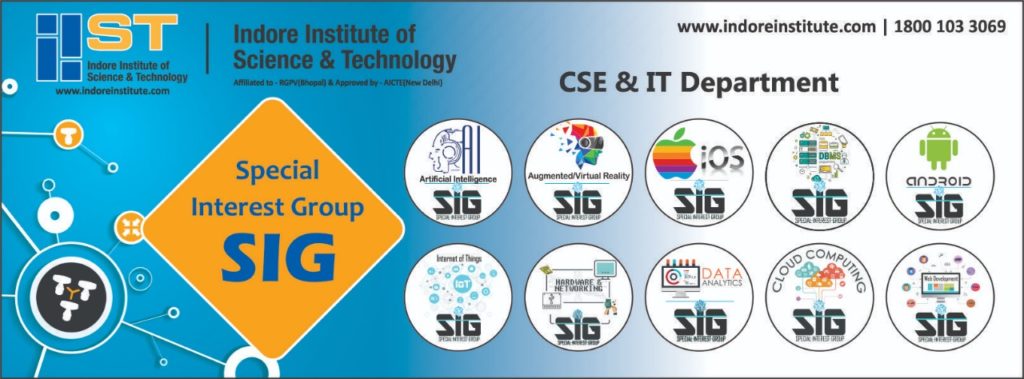
We provide certified skill courses on latest research areas and technologies through our special interest groups (SIG’s)
1. SIG- Artificial Intelligence: The overall purpose of artificial intelligence SIG is to apply different algorithms on raw data so as to allow computers and machines to function in an intelligent manner efficiently. And to evaluate and analyse the patterns of the data. Under this SIG, Students will get chance to implement these algorithm and create artificially intelligence systems.
2. SIG- Augmented and Virtual Reality: The purpose of VR/AR SIG is to understand artificial environment that is created with software for user perception and also to understand how AR works with real world image with extra layers of digital information and to gain better understanding of its wide range of applications.
3. SIG- iOS: Purpose of iOS SIG is to make students develop iOS Applications. With the amount of iPhones in the market, the need for iOS Apps also increases therefore this is the right platform for Students who want to build their career in Mobile app development as individual with their Creative ideas.
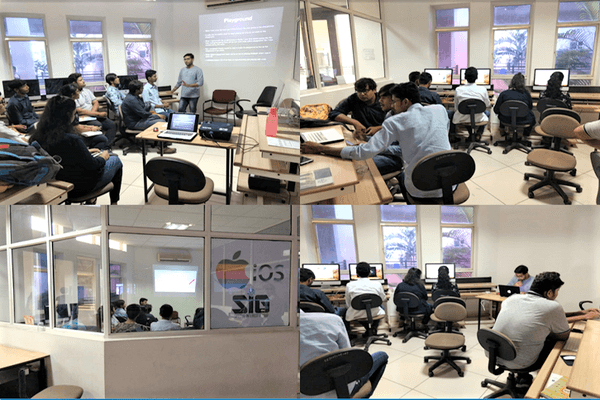
4. SIG- Database Management System: The purpose of DBMS SIG is to learn and practice software tools that organizes data that is to create, retrieve, update and manage data, in systematic way. Under this SIG trainings will be provided on software technologies like SQL, MySQL, Oracle Databases, NoSQL, MongoDB etc.
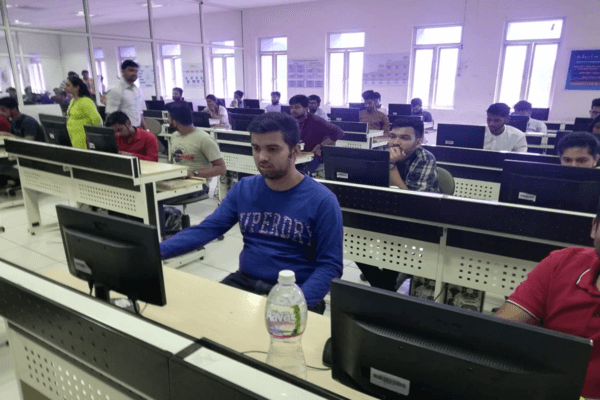
5. SIG- Android: Purpose of Android SIG is to make students understand Android App Development. In this SIG, students will learn the fundamentals of Kotlin, Google’s preferred programming language for Android and build interesting applications. Under this SIG training will be provided which will cover the Android components, tools and technologies like multi-screen Navigation, Android Studio, Intents, Fragments, Widgets, Layout and Ionic to build modern applications.
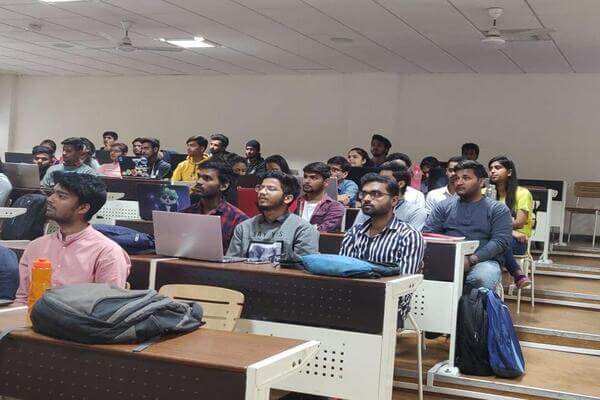
6. SIG- Internet of Things: The purpose is to train students for industry-level projects on IoT by: Organizing workshops/seminars/training/weekend activities for the students. IoT SIG facilitates with all the required equipments for practicising on different modules. These SIG Modules will help students to solve real-world problems and will encourage them to participate in various competitions across the country.
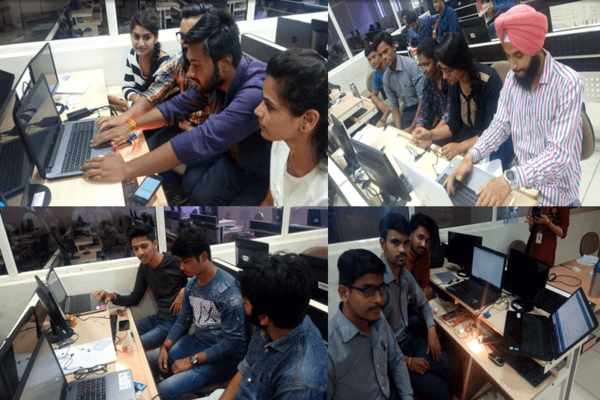
7. SIG- Hardware and Networking: Primary objective of this SIG is to build networking skill and creating a bridge to employment opportunities. Here the students are trained for international certifications like Microsoft, Cisco and Red Hat certifications. Students will learn hardware and operating systems for computer networks and train to upgrade troubleshoot and administer the system which will help them prepare for high-paying jobs. PC hardware/software installation, Networking technologies & concepts, Network administration, Cabling, Cisco router and switch configurations are the key skills focused in this SIG.
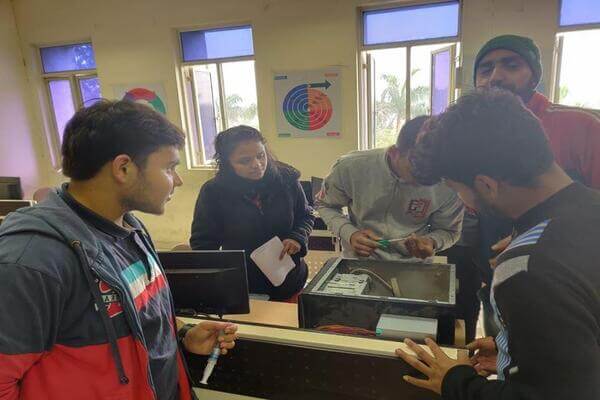
8. SIG- Data Analytics: The major purpose of Data Analytics SIG is to extract useful information from data and taking the decision based upon the data analysis or in simple words to create best out of waste. Here the students are trained to analyse different-different type of dataset and though that understand the pattern of informations that can be derived through that data. Hadoop, R and Python are some technologies which can be used to implement analytics.
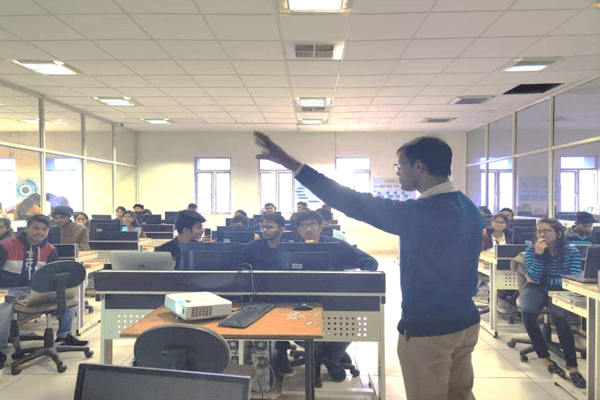
9. SIG- Cloud Computing: Cloud Computing curriculum prepare the students to pursue industry recognized certifications (AWS), and in-demand cloud jobs. In CC SIG, we train students by organizing workshops/seminars/internship. This helps learners explore cloud concepts, use cloud services, handling of security issues, and understand the architecture etc.
10. SIG- Web Development: Web development can range from developing a simple single static page of plain text to complex web-based internet applications (web apps), electronic businesses, and social network services. Web Development SIG gives an opportunity to the students to enhance their skill for web development platform.
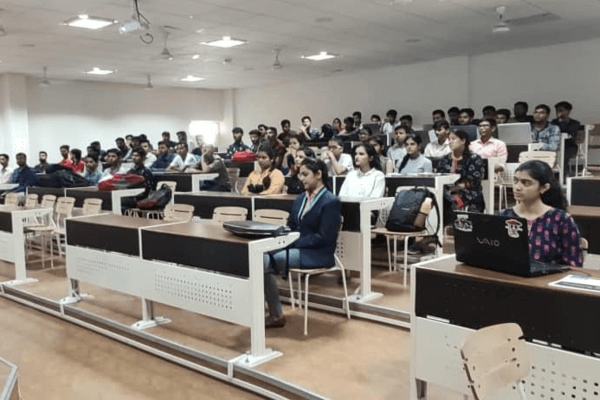
It is an initiative of Ministry of Human Resource Development (MHRD) under the National Mission on Education through ICT. The Department of CSE conducts virtual labs programs organized by different IITs across the country.
Department of CSE & IT is proud to be associated with Developer Student Clubs (DSC) with the selection of DSC lead from IIST. The DSC will conduct in-house training activities for the students to enable them to develop solutions for the local businesses.
IIST is proud to announce that we have been accepted into the AWS Academy program with Amazon Internet Services Private Limited (“AISPL”) and we are now authorized to administer and deliver the AWS Academy Cloud Computing Architecture curriculum.
Department of CSE has signed an MoU with RedHat Academy to conduct in-house training on Core System Administration, Middleware Development, Cloud Computing along with Internships in live projects & certification.
Department of CSE & IT has associated with Microsoft Imagine Academy to offer Microsoft Certified Courses in the areas of Productivity, Web Development, Data Science and Managing IT Infrastructure.
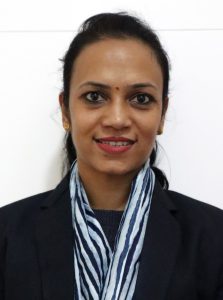
Dr. Margi Patel
Associate Professor
Head of Department
Information Technology
Email: margi.patel@
LinkedIn: https://www.linkedin.com/in/margi-patel-677b3667/
In today’s global era, one cannot imagine life without computer. Importance of computer is widely accepted as crucial part in modern day education too. Information Technology and novel data analysis is the need of today’s majority of industries, businesses, government, and any endeavour. Information Technology, a discipline which is now widely recognized as an essential source of tools and techniques for advancements in nearly all spheres of human endeavours. In the span of just a few decades Information Technology based systems, principles and techniques have pervaded modern society. Information technology currently plays a significant role in many different fields. Professionals in the IT field work with businesses and organizations to set up and support viable computer networks that will keep systems efficient and reliable. IT encompasses all hardware and software used in the storing, creation and accessing of information. Examples of technologies that professionals work with are firewalls, databases, media storage devices, networks and the Internet.
An IT engineer has number of different tracks to pursue like web development, data scientist, system programmer, software tester, database administrator to name a few. In view of such ever growing need of skilled computer graduates, IIST thrives for overall development of individual apart from making them Industry ready with required skill set. Besides technical skills, we empower students with strong soft skills which help them to stay one step ahead in the competition. This is accomplished by formation of various Skill Improvement Groups ( SIGs), Special training on communication skills and soft skills.
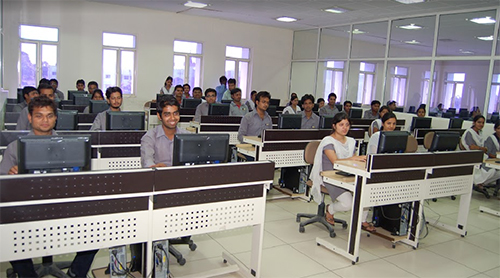
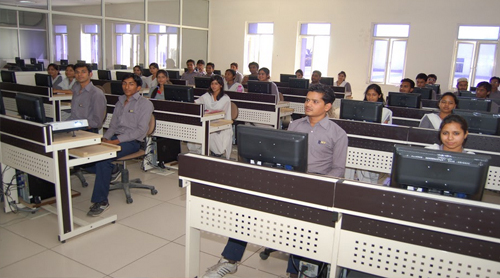
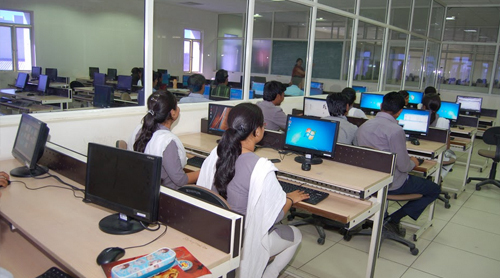
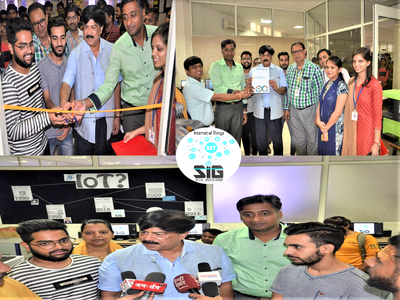
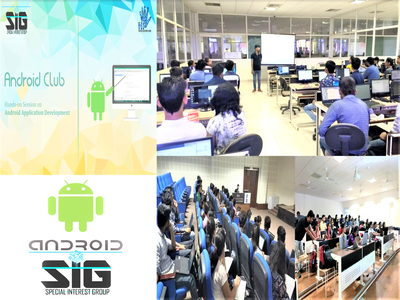
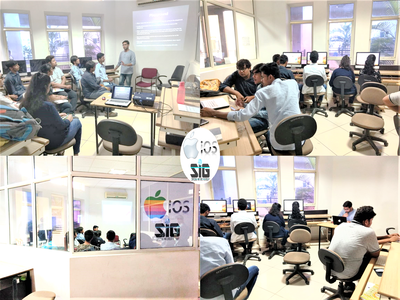
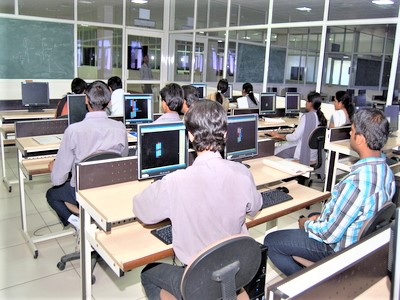
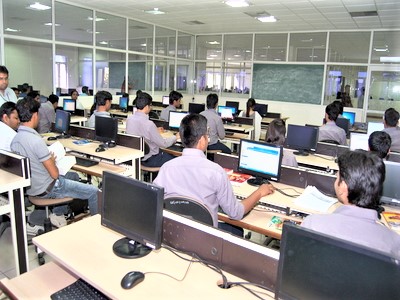
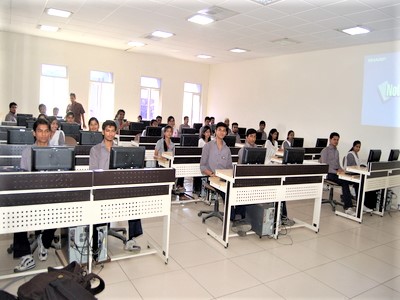
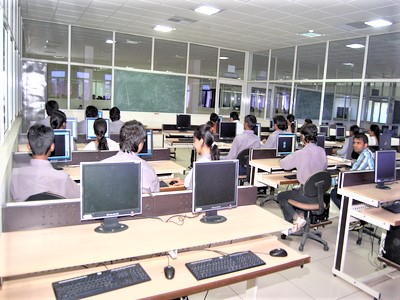
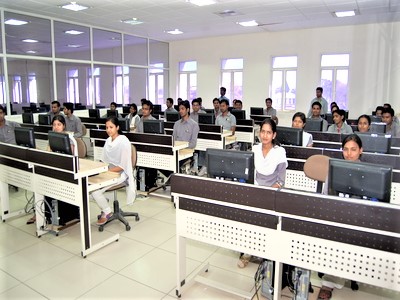
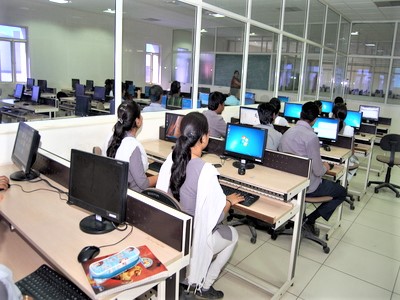
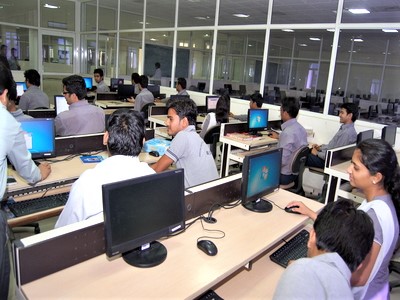
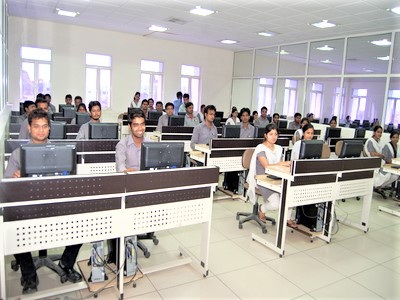
Talking about IT careers, there is a rich set of opportunities available in information security, software development, sales, Management applications, databases, object-oriented segments, and research areas, to name a few, both in private as well as govt. /public sector. This ensures bright careers for all the existing IT graduates as well as future IT career aspirants. This fact is more supported by the advent of big IT corporate blooming in Indore at Super Corridor. It is expected that thousands of job opportunities in IT would be generated in near future and a major segment of IT professionals would be absorbed from Indore and surrounding areas. We, therefore, are apt to provide adequate and sound technical training and skill development to our students to make them stand upright with confidence and to enable them to tap the mushrooming opportunities.
There are a number of career opportunities available in the Information Technology sector. These opportunities are increasing exponentially day by day. Following are a few areas where IT aspirants can build their career –
| S.no. | Faculty Name | Paper Publication |
| Academic Year 21-22 | ||
| 1 | DR. RAJKUMAR JAIN | REGION BASED NODE ORGANIZATION WITH ENERGY EFFICIENT-MECHANISM-FOR-ON- DEMAND-ROUTING-PROTOCOL-IN-MOBILE AD-HOC NETWORK IN DOGO RANGSANG RESEARCH JOURNAL |
| 2 | DR. SATHISH KUMAR PENCHALA | STUDY ON NETWORK MODEL AND TRANSMISSION OF INFECTIOUS DISEASES IN HOSPITALS IN IJBPAS |
| 3 | DR. SATHISH KUMAR PENCHALA | SMART CITIES AND EMBEDDED IOT SENSOR SYSTEMS TO IMPROVE THE PERFORMANCE OF THE AUTOMATED ENVIRONMENT IN IJBPAS |
| 4 | DR. DHEERAJ RANE | STUDY ON NETWORK MODEL AND TRANSMISSION OF INFECTIOUS DISEASES IN HOSPITALS IN IJBPAS |
| 5 | DR. DHEERAJ RANE | SMART CITIES AND EMBEDDED IOT SENSOR SYSTEMS TO IMPROVE THE PERFORMANCE OF THE AUTOMATED ENVIRONMENT IN IJBPAS |
| 6 | MS. MARGI PATEL | GEDSET: AUTOMATIC DATASET BUILDER FOR MACHINE TRANSLATION SYSTEM WITH SPECIFIC REFERENCE TO GUJARATI-ENGLISH PRESENTED IN 11TH INTERNATIONAL ADVANCED COMPUTING CONFERENCE HELD ON 18TH & 19TH DECEMBER, 2021 AT UNIVERSITY OF MALTA, MALTA |
| 7 | MS. MARGI PATEL | GUJAGRA: AN ACYCLIC GRAPH TO UNIFY SEMANTIC KNOWLEDGE, ANTONYMS AND GUJARATI-ENGLISH TRANSLATION OF INPUT TEXT PRESENTED IN 4TH INTERNATIONAL CONFERENCE ON MACHINE INTELLIGENCE AND SIGNAL PROCESSING HELD IN MARCH 2022 |
| 8 | MS. MARGI PATEL | DSETGENS: AN AUTOMATED TECHNIQUE FOR BUILDING DATASET FROM SPEECH WITH RESPECT TO GUJARATI-ENGLISH PRESENTED IN 11 IEEE INTERNATIONAL CONFERENCE ON COMMUNICATION SYSTEM AND NETWORK TECHNOLOGIES (CSNT) 2022 HELD IN APRIL 2022 |
| 9 | MS. MARGI PATEL | FUTURE ASPECTS OF ARTIFICIAL INTELLIGENCE IN GIS SCIENCE JOURNAL |
| 10 | MS. ALPANA MEENA | FUTURE ASPECTS OF ARTIFICIAL INTELLIGENCE IN GIS SCIENCE JOURNAL |
| 11 | MR. PRADEEP BANIYA | REGION AND ANGLE BASED NODE ORGANIZATION LOCATION UPDATE IN MOBILE AD-HOC NETWORKS IN DOGO RANGSANG RESEARCH JOURNAL |
| 12 | MR. PRADEEP BANIYA | MULTI-FUNCTION E-SCARECROWKAAG BHAGODA SMART-FARMING AND CROP SAFETY WITH IOT/AI IN DOGO RANGSANG RESEARCH JOURNAL |
| 13 | MR. PRITESH SAKLECHA | PLAN AND DEVELOPMENT OF SMART MIRROR DISPLAYING REAL-TIME SENSOR DATA USING RASPBERRY PI IN JOURNAL OF EDUCATION: RABINDRA BHARATI UNIVERSITY |
| 14 | MS. NEHA TALREJA | PLAN AND DEVELOPMENT OF SMART MIRROR DISPLAYING REAL-TIME SENSOR DATA USING RASPBERRY PI IN JOURNAL OF EDUCATION: RABINDRA BHARATI UNIVERSITY |
| 15 | MR.AMIT GOUD | MULTI-FUNCTION E-SCARECROWKAAG BHAGODA SMART-FARMING AND CROP SAFETY WITH IOT/AI IN DOGO RANGSANG RESEARCH JOURNAL |
| 16 | MS. DIPTI REGE | REGION AND ANGLE BASED NODE ORGANIZATION LOCATION UPDATE IN MOBILE AD-HOC NETWORKS IN DOGO RANGSANG RESEARCH JOURNAL |
| Academic Year 22-23 | ||
| 1 | DR. SATHISH KUMAR PENCHALA | ROLES AND FUTURE OF THE INTERNET OF THINGS – BASED SMART HEALTH CARE MODELS PRESENTED IN 2023 |
| 2 | DR. SATHISH KUMAR PENCHALA | ENERGY EFFICIENT DATA TRANSMISSION IN WIRELESS SENSOR NETWORK USING CROSS SITE LEAPING ALGORITHM PRESENTED IN INTERNATIONAL CONFERENCE ON COMPUTATIONAL INTELLIGENCE AND COMPUTING APPLICATIONS-21 IN 2022 |
| 3 | DR. DHEERAJ RANE | THE PATH OF RURAL INDUSTRY REVITALIZATION BASED ON IMPROVED GENETIC ALGORITHM IN THE INTERNET ERA PRESENTED IN COMPUTATIONAL INTELLIGENCE AND NEUROSCIENCE IN 2022 |
| 4 | DR. DHEERAJ RANE | NEXT GEENRATION OPTIMIZATION MODELS AND ALGORITHMS IN CLOUD AND FOG COMPUTING VERTULIZATION SECURITY: THE PRESENT STATE AND FUTURE PRESENTED IN SCIENTIFIC PROGRAMMING IN 2022 |
| 5 | DR. MARGI PATEL | AN INTEGRATED APPROCH TO ANALYZING AND MEASURING WHEATHER DATA FOR WHEATHER FORCAST PREDICTION PRESENTED IN 3RD INTERNATIONAL CONFERENCE ON ARTIFICIAL INTELLIGENCE, 5G COMMUNICATIONS AND NETWORK TECHNOLOGIES IN 2023 |
| 6 | DR. MARGI PATEL | AGE AND GENDER RECOGNITION USING DEEP LEARNING TECHNIQUE PRESENTED IN 3RD INTERNATIONAL CONFERENCE ON SMART DATA INTELLIGENCE (ICSMDI) 2023, KONGUNADU COLLEGE OF ENGINEERING AND TECHNOLOGY IN 2023 |
| Academic Year 23-24 | ||
| 1 | MR. NISHANT VIJAYWARGI | A COMPRIHENSIVE STUDY ON MACHINE LEARNING BASED APPROACHES FOR OBJECT DETECTION VOLUME 12 ISSUE 5 IN 2023 |
| 2 | DR SHWETA AGRAWAL | A SYSTEMATIC REVIEW ON DEEP LEARNING‐BASED AUTOMATED CANCER DIAGNOSIS MODELS, JOURNAL OF CELLULAR AND MOLECULAR MEDICINE, |
| 3 | DR SHWETA AGRAWAL | ROBUST CONTROL OF FREQUENCY CONSIDERING OPERATIONS OF AC MICROGRID IN ISLANDED MODE, INDERSCIENCE INTERNATIONAL JOURNAL OF ENGINEERING SYSTEMS MODELING AND SIMULATION. |
| 4 | DR. MARGI PATEL | SOFTWARE ARCHITECTURE SURVEY FROM AN EDGE COMPUTING PERSPECTIVE” PRESENTED IN 1ST INTERNATIONAL CONFERENCE ON COGNITIVE, GREEN AND UBIQUITOUS COMPUTING (IC-CGU), C V RAMAN GLOBAL UNIVERSITY, ODISHA DURING 1-2 MARCH IS NOW ONLINE AND AVAILABLE ON IEEE XPLORE (HTTPS://IEEEXPLORE.IEEE.ORG/DOCUMENT/10530838) |
| 5 | DR. MARGI PATEL | TOOTH SEGMENTATION AND DETECTION USING U-NET AND ATTENTION-BASED U-NET TECHNIQUE PERSENTED IN IEEE SPONSORED INTERNATIONAL CONFERENCE ON MULTIDISCIPLINARY RESEARCH IN TECHNOLOGY AND MANAGEMENT (MRTM 2023) 22-23 SEPT 2023 |
| 7 | MR. VIVEK GUPTA | PREDICTION-BASED LEARNING TO ENHANCE THE AI ESSENSIALITIES ON THE STEPS OF CROP FARMING PRESENTED & PUBLISHED IN NATIONAL CONFERENCE ON ADVANCE ENGINEERING FRONTIERS: INNOVATION, CHALLENGES AND SOLUTION 2024 |
| 8 | MR. VIVEK GUPTA | A REVIEW OF SOYABEAN CROP CLASSIFICATIONAND DISEASES IDENTIFICATIONSUSING AI LEARNING AND IOT BASED MODELS IN 15th IEEE INTERNATIONAL CONFERENCE ON COMPUTING COMMUNICATION NETWORK TECHNOLOGIES 2024 |
| 9 | DR RICHA T GUPTA | PREDICTION-BASED LEARNING TO ENHANCE THE AI ESSENSIALITIES ON THE STEPS OF CROP FARMING PUBLISHED IN NATIONAL CONFERENCE ON ADVANCE ENGINEERING FRONTIERS: INNOVATION, CHALLENGES AND SOLUTION 2024 |
1. Department of IT hosted a Learn-A-Thon from 27 April 2023 to 5 May 2023 on International Girls in ICT Day to motivate young people to consider Science, Technology, Engineering, Arts and Math (STEAM) subjects. Under this Learn-A-Thon, students completed a certification course on Introduction to Cyber Security provided by Cisco. Total 38 students (girls) were benefited from this Learn-A-Thon. In this certification course, students were made aware that how today’s interconnected world makes everyone more susceptible to cyber-attacks. Students learned about how to protect one’s personal privacy online while gaining additional insight on the challenges companies, governmental and educational institutions face today.
2. Department of Information Technology organized a Training on Algorithms for the students of second year. Trainer for the same is Mr. Pritesh Saklecha, Corporate Trainer and GATE Expert (Qualifies GATE 9 times). The objective of the training is to educate all the participants about the algorithm, why an algorithm is written and who writes an algorithm etc. The concepts about the algorithms were made easy by the speakers which were easily understood by the students.
The Pre Kavach Hackathon of IIST was conducted on 1 April 2023. On 27 March a brief about Pre Kavach hackathon was given. Briefing was given in offline mode and pre kavach was an online. There were idea presentations from 28 teams. The idea-cum-team selection was conducted by panel of 3 Judges during the Internal Hackathon and the judgment was solely based on the Ideas [that were presented by prospective team in prescribed format]. Total 15 teams are nominated from institute for Kavach Hackathon 2023 that is organized by MoE’s Innovation Cell, AICTE along with Bureau of Police Research and Development and Indian Cybercrime Coordination Centre.
4. Information Technology department organized an Expert lecture on “How to Start a Startup?” on 3 March 2023. Guest for the session were Mr. Aditya SG Vyas CEO, IITI DRISHTI CPS Foundation and Dr. Dheeraj Rane from IIT Indore. Session was graced by Honourable Director General Shri Arun S Bhatnagar sir, Principal Dr. Keshav Patidar sir and Academic Dean Dr. B. K. Joshi sir. Session started with motivational lecture of honourable DG sir. During his address he highlighted various funding provided by different authorities and government.
During the session Mr. Aditya SG Vyas CEO, IITI DRISHTI CPS Foundation, IIT Indore shared his valuable guidance to students and faculty members about everything from ‘What is a Start-up?’ to ‘How to establish a Start-up?’ During his session he highlighted the difference between business and startup with the help of real-life example. Total 172 students attended this session.
5. The Department of Information Technology organized Training on Advanced Java for Third Year students. Trainer for the same was a technology enthusiast Mr.Pankaj Wadhwani, Director and Co-founder of Programming World. Training started with the Introduction and historical context of Java. He discussed logics for solving real world problems, leveraging strengths of Java in application design, coding hygiene and programming paradigm. After that, he explained usage of Java in the industry and also emphasized on design patterns & best programming practices. During the training the students were guided to choose their Career path powered by Java and build their brand in the open source community. At the end, he motivated the students to do JAVA Certification to increase their employability. The curiosity of the students reflected through the questions posed by them.
6. Information Technology department organized a training cum certification course on “AI Based Product Development” from 16 to 22 Dec 2022. Trainer for the same was Mr. Shivang Trivedi from Codenscious, Indore. He gave training on Machine Learning and Deep Learning techniques from scratch. During his session he gave emphasis on concepts of basic models from training to testing the entire dataset. The main purpose of this training was to enable students to get detailed insights of AI with hands-on to some models. This Training was very beneficial for students looking towards the industry point of view and to make decision about their career prospect in AI product development.
Value Proposition Fit” & “Business Fit
AIML department organized Online Session on “Value Proposition Fit” & “Business Fit” for CSE and allied branch students. The Training has been taken by Dr. Satya Vardhan Tiwari. He motivated students to believe in their own potential to reach their destination. This lecture was very beneficial for students looking towards the industry point of view and to make decision about their career prospect in marketing and startups.
Foundation of Data Structure and Algorithm
45 hours Training on “Algolution: Foundation of Data Structure and Algorithm” was organized for students of CSE and allied department in which trainer was Mr. Pritesh Saklecha. He gave training on Data Structure and algorithm from scratch and he explains so many important concepts of Stack, Queue, Linked List, Tree and all the basics of data structure. The main purpose of this training was to enable students to get detailed insights of DSA with hands-on practical implementation. This Training was very beneficial for students looking towards the industry point of view and to make decision about their career prospect in software development.
World Entrepreneurship Day
An Expert Lecture on Entrepreneurship was organized on World Entrepreneurship Day. Resource person for the same was Mr. Sameer Sharma. In his address; he delves into the key principles and practices essential for aspiring entrepreneurs. He emphasizes the importance of innovation, resilience, and adaptability in the dynamic landscape of business. Expert highlights the significance of identifying market opportunities, creating value for customers, and building a strong brand presence. Throughout the lecture, he shared insights from his own entrepreneurial journey, illustrating the challenges and triumphs he encountered along the way. Moreover, he emphasizes the significance of effective communication and networking skills in building meaningful relationships with stakeholders, investors, and customers.
An expert session on Cyber Security Awareness was organized for the students of second year. Speaker for the session was Mr. Rajesh Dandotiya, Additional Deputy Commissioner of Police Crime Branch, Indore. Session was taken in a way to help participants learn the basics of cyber security. During the session, Mr. Dhandotiya guided students through a different real case which was encountered in different parts of India. Main objective to organize this session was to make students aware about various types of cyber attacks and to guide them to be take preventive measures so that students do not get trapped in any type of cyber crime.
Expert Lecture on How to Crack Google
Expert lecture was organized for the students of IV year on “How to Crack Google”. Resource person for the same was Mr. Mahendra Chouhan (Software Engineer and Full Stack Developer, Google). The lecture began with an exploration of Google’s corporate culture and values. Emphasis was placed on the importance of aligning personal values with those of Google, highlighting innovation, inclusivity, and ethical business practices.
Detailed discussions were held on the technical skills expected by Google, including proficiency in programming languages, data structures, algorithms, and system design. Additionally, soft skills such as teamwork, communication, and problem-solving were underscored as crucial. The lecture concluded with a discussion on career growth opportunities at Google, emphasizing continuous learning, adaptability to change, and taking initiative in one’s professional development.
The expert lecture on “How to Crack Google” successfully equipped participants with the knowledge and strategies needed to navigate Google’s competitive hiring process. By focusing on both technical proficiency and personal development, attendees gained valuable insights into positioning themselves as strong candidates for roles at Google.
FDP on research methodology was organized for faculties of IIST. Resource person for the same were Mr. Rakesh Soni, Dr. Shweta Agrwal, Dr. Richa Gupta, Dr. Puneet Duggal, Dr. Veena Dadhwani. The FDP aimed to equip participants with essential skills, knowledge, and techniques required to conduct high-quality research across various disciplines.
The primary objectives of the FDP were to familiarize participants with the fundamentals of research methodology and its significance in academic and professional contexts; to provide an overview of different research paradigms, methods, and approaches; to enhance participant’s understanding of research design, sampling techniques, data collection methods, and analysis procedures; to discuss ethical considerations in research and principles of academic integrity and to empower participants to apply research methodology effectively in their respective fields of expertise.
Full Stack Development and Data Science
An expert lecture on Full Stack Development and Data Science was organized on the occasion of Engineers Day. The resource person for the same was Mr. Goutham Dalai. He discussed full stack development and various related concepts of data science from scratch. He also explained many important concepts of data mining with decision-making, data storage, and revenue generation and explained how it is helpful for organizations to maintain complex data processing systems.
IIST visited IIT, Indore
Students from IIST visited IIT, Indore for an expert lecture on “From Technology to Startup” on September 22, 2023 (02:00-03:30 PM) organized by IIT Indore & IITI DRISHTI CPS Foundation under public lecture series. The key speaker was Mr. Rafiq Somani, Area Vice President, India, and South Pacific, ANSYS Inc, Pune and Member, BoD, & IITI DRISHTI CPS Foundation. The speaker emphasized the benefits of the start-up program and the potential for Indian engineering start-ups. Talking about disruptive innovation ideas, he explained how Ansys’ simulation software empowers start-ups to enhance product design and development for quicker time-to-market. All is done in the virtual fashion. Giving various examples of Indian startups like Praan-Air purification technology, IIT Kanpur’s Ventilator project etc, he shared the success stories and principals to initiate startups. He very interestingly discussed the reasons why start-ups fail and shared the principal of ASSURED innovation for assured success.
The Pre Kavach Hackathon of IIST was conducted on 1 April 2023. On 27 March a brief about the Pre Kavach Hackathon was given. Briefing was given in offline mode and Pre Kavach was online. There were idea presentations from 28 teams. The idea-cum-team selection was conducted by a panel of 3 Judges during the Internal Hackathon and the judgment was solely based on the Ideas [that were presented by prospective team in prescribed format. It was suggested that student teams should invest sufficient time in conceptualization of the solution to the stated problem statements and create the idea document for submission. Team registrations started from 24 March to 31 March 2023. Evaluation parameters were Relevance of Problem and Solution, Feasibility of Solution and Sustainability. Total 28 Teams participated.
Female students of IIST visited IIT Indore for the launch of a women-oriented pre-incubation Shakti 1.0.
Technical Poster Making Competition
Technical Poster Making Competition was organized for the students of second year on Engineer’s Day. Students presented their innovative skills by developing posters by using the software tools like MS-Word, MS-PowerPoint, Canva, etc.
Winners for the same are :
Training on Core Java Skill
45 Hours training was organized for the students of II year. Resource person for the same was Mr. Pankaj Wadhwani. He gave training on Java Technology from scratch and he explained so many important concepts in programming . The technology is very demanding and has a great potential to accelerate the career of students. The main purpose of this training was to enable students to get detailed insights of Java Programming with hands-on sessions. This Training was very beneficial for students looking towards the industry point of view and to make decisions about their career prospects in Java product development.
Full Stack Web Development
The training on Full Stack was organized for the students of third year. Resource person for the same was Mr. Pankaj Wadhwani. He gave training on ‘HTML, JavaScript JSP, Servlets and JDBC for Beginners: Build a Database App’ from scratch and he explains so many important concepts of MVC model, DAO, Java Bean classes etc. The main purpose of this training was to enable students to get detailed insights of full stack web development with hands-on to some basic database application.
Expert Lecture on How to Crack Google for III Year Students
Expert lecture was organized for the students of III year on “How to Crack Google”. Resource person for the same was Mr. Mahendra Chouhan (Software Engineer and Full Stack Developer, Google). The session aimed to equip participants with essential strategies, skills, and insights necessary to pursue career opportunities at Google, one of the world’s leading technology companies. The primary objectives of the session were to provide an overview of Google’s company culture, values, and expectations from candidates; to offer insights into the recruitment process at Google, including resume preparation, interview techniques, and assessment criteria; to equip participants with technical and non-technical skills required to succeed in Google’s competitive hiring environment; to share tips and strategies from successful Google employees and industry experts. By the end of the session, participants gained a clear understanding of Google’s recruitment process and what it takes to stand out as a candidate.